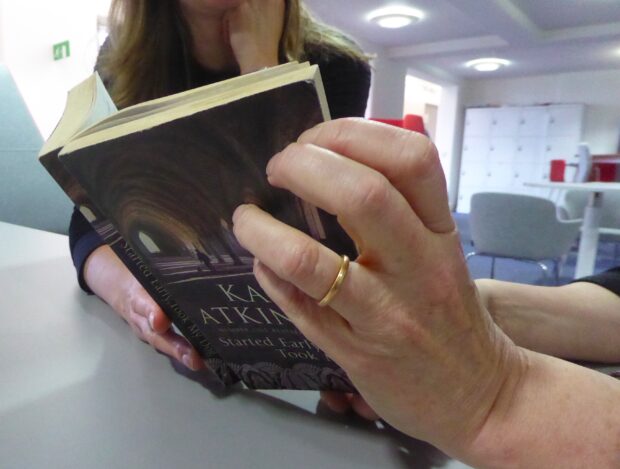[Editor’s note: Guest post written by Debbie Hicks, who is leading The Reading Agency’s Reading Friends programme.]
October has been a significant month for us at The Reading Agency, and has highlighted the need for our work now more than ever. We published our evaluation findings from Reading Well on World Mental Health Day, and the government also announced their new loneliness strategy, to which we contributed evidence on the impact of reading on loneliness. The month reminded us of the importance of tackling life’s big challenges through the proven power of reading and the impact that this can have.
The potential of reading to combat loneliness has been on The Reading Agency agenda for a number of years, and has led to the development of Reading Friends. The government’s loneliness strategy highlighted the instrumental role that libraries and the charity sector can play in tackling loneliness, and Reading Friends does just that.
So, what is Reading Friends?
Reading Friends is a UK wide befriending scheme, which uses reading to tackle loneliness. It was developed by us at The Reading Agency working with partners and funded by the Big Lottery Fund. The programme has been designed with older people and is delivered by volunteers. By sharing stories in groups or one to one sessions, Reading Friends empowers and engages older people who are vulnerable and isolated, including people with dementia and carers.
We work closely with local organisations – such as libraries, charities and community groups. Our local partners allow us to reach some of the most vulnerable, and socially isolated individuals across the UK, and libraries play a vital role in that.
In our pilot phase, libraries have served as key community centres for Reading Friends participants across the UK. Through the support of dedicated librarians, Reading Friends have accessed reminiscence materials, and memory boxes as well books, magazines and newspapers for their sessions.

In Scotland, libraries served as the meeting point for 10 pairs of intergenerational Reading Friends between elderly people and school pupils. There is amazing work underway in libraries across the UK, including Oldham, Newcastle, Conwy and Stirling who have all delivered projects and West Sussex and Sheffield libraries who have supported projects in their area. The support of libraries means that Reading Friends is a truly UK-wide programme.
Why is combating loneliness so important?
Loneliness can have a devastating impact whatever age you are. It can be as bad for you as smoking 15 cigarettes a day and can even increase the risk of heart disease, depression and dementia. But some communities are especially vulnerable, with a million people over 65 stating that they are always or often lonely. Trigger points such as bereavement, retirement, becoming a carer or declining health play a part, but whatever the cause loneliness is definitely a taboo subject: 92% of us think people are scared to admit they are lonely. Reading Friends shows that reading can be part of the solution. It can connect people to start conversations, share stories and enrich each other’s lives.
Does Reading Friends work?
In our initial evaluation we found that 88% of Reading Friends agreed the programme had ‘increased opportunities for social contact’. 90% of Reading Friends participants would recommend the programme to others, and 100% of volunteers would recommend the programme to others. We believe that Reading Friends can play a vital part in tackling loneliness.
How can people get involved?
The Reading Agency has a range of programmes that can be found via our website.
We welcome interested people to register their interest in Reading Friends online via our website. You can also sign up to the newsletter to keep up-to-date with all things Reading Friends, and follow us on Twitter.
--------------------------------------------------------------------------------------
Please note, this is a guest blog. Views expressed here do not necessarily represent the views of DCMS or the Libraries Taskforce